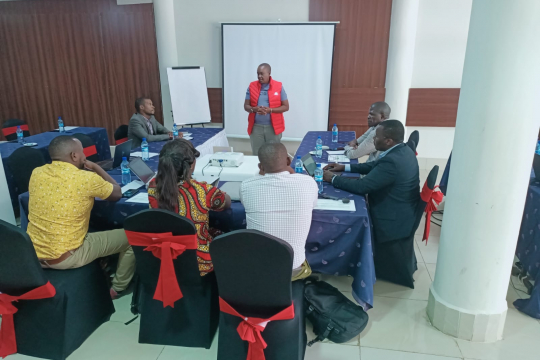EfD Kenya convened a policy dialogue on May 4, 2023, with key stakeholders from the Kisumu, Siaya, and Homabay counties to identify challenges and devise effective solutions for the degradation issues of Lake Victoria. They outlined a series of actions as the way forward.
The participants represented the National Environmental Management Authority (NEMA), Lake Victoria Basin Development Authority (LBDA), Beach Management Units (BMU), Kisumu Water and Sanitation Company Limited (KIWASCO), and Kenya Marine and Fisheries Research Institute (KMFRI).
Faces numerous challenges
Lake Victoria is the second-largest freshwater lake in the world and the largest lake in Africa. It spans several countries including Kenya, Uganda, and Tanzania. It also provides important ecosystem services such as food, transportation, employment, tourism, climate regulation, disease control, and flood control.
However, the basin faces numerous challenges, such as environmental degradation, lack of proper training and regulation for sustainable fish cage farming, pollution from mercury and sodium cyanide in gold extraction, pollution from the use of fertilizers and pesticides, increased treatment costs, lack of harmonized policies and regulatory frameworks, insufficient capacity and authority to enforce rules, and unlicensed businesses along the shores like the car wash businesses releasing soap chemicals into the lake.
Integrating clean technology
The participants recommended the implementation of urban agriculture, integrated organic agriculture, sustainable land use practices, efficient water use during irrigation, adoption of Cleaner Production Technologies (CPT), elimination of cyanide, adoption of Gold Dressing Agent (GDA is a product used in gold extraction and meets environmental requirements), regulating aquaculture practices, eliminating destructive fishing gears, enforcing allowable catch, enhancing waste management technologies, conducting research initiatives and integrating environmental considerations in County Integrated Development Plans (CIDPs) and others.
Politics hamper existing policies and regulations
From the discussions, it was noted that the lake faces various gaps and challenges in its existing policies and regulations. These include a lack of coordination and data sharing among institutions, a lack of political goodwill in the enforcement of existing policies and laws, limited resources for the enforcement of laws and regulations, and lack of regulations to guide and empower Beach Management Units.
Way forward
The stakeholders outlined a series of actions as the way forward. These actions include the development of specific policies and regulations tailored to the basin, a collaboration between the Coast Guard and relevant authorities, and the establishment of a regional monitoring commission under the East African Community. Furthermore, engaging organizations in Extended Producer Responsibility (EPR) initiatives ensures accountability for waste collection and management in the basin. These measures collectively aim to foster sustainability and safeguard the environment of the Lake Victoria Basin.
By: Jane Maina
